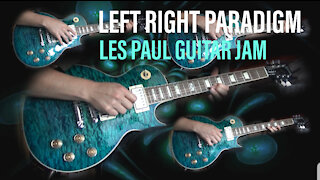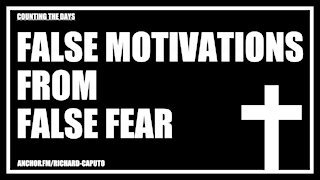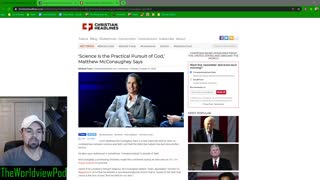Premium Only Content

Divide and Conquer: My Break From The False Left Right Paradigm #walkaway #blexit
Originally published on Mar 23, 2018
Breaking Free Of The False Left Right Paradigm is a video about my political transformation, how I broke free from the false left right paradigm. #blexit #walkaway The "false left–right paradigm" is the political theory that members of opposing political parties such as Republican and Democrat deceptively share common interests and goals, as a one body ruling authority over the masses. The two parties act to create divisiveness and influence the general population while keeping control of the political spectrum. The false left–right paradigm political theory is closely related to theory of Inverted totalitarianism and Managed Democracy. #walkaway
The false left–right paradigm theorizes that opposing political groups use their influence over the establishment media to dramatize party warfare distraction, in grand performances of bureaucratic rivalry meant to propagandize and divide the populace. Psychological deception is coordinated on all levels of politics and fed through controlled media outlets to divert attention away from the ruling class's hidden agendas. By drawing attention to differences between two political systems, ideologies, races, and classes, the political groups obscure and divide unity among the masses. The tactic creates confusion and frustration among the population, enabling the global elite to increase and consolidate their wealth and power through maintaining an illusion of a two-party system of checks and balances.
Former Council on Foreign Relations (CFR) archivist and Georgetown University professor Carroll Quigley, who is known as being President Bill Clinton’s mentor, wrote in his 1966 book "Tragedy and Hope"—
"The argument that the two parties should represent opposed ideals and policies, one, perhaps, of the Right and the other of the Left, is a foolish idea acceptable only to the doctrinaire and academic thinkers."
"Instead, the two parties should be almost identical, so the American people can 'throw the rascals out' at any election without leading to any profound or extreme shifts in policy."
Divide and rule (or divide and conquer, from Latin dīvide et imperā) in politics and sociology is gaining and maintaining power by breaking up larger concentrations of power into pieces that individually have less power than the one implementing the strategy. The concept refers to a strategy that breaks up existing power structures, and especially prevents smaller power groups from linking up, causing rivalries and fomenting discord among the people.
The false left right paradigm goes hand in hand with the Hegelian dialectic. Hegelian dialectic, usually presented in a threefold manner, was stated by Heinrich Moritz Chalybäus as comprising three dialectical stages of development: a thesis, giving rise to its reaction; an antithesis, which contradicts or negates the thesis; and the tension between the two being resolved by means of a synthesis. In more simplistic terms, one can consider it thus: problem → reaction → solution. Although this model is often named after Hegel, he himself never used that specific formulation. Hegel ascribed that terminology to Kant. Carrying on Kant's work, Fichte greatly elaborated on the synthesis model and popularized it.
On the other hand, Hegel did use a three-valued logical model that is very similar to the antithesis model, but Hegel's most usual terms were: Abstract-Negative-Concrete. Hegel used this writing model as a backbone to accompany his points in many of his works.
The formula, thesis-antithesis-synthesis, does not explain why the thesis requires an antithesis. However, the formula, abstract-negative-concrete, suggests a flaw, or perhaps an incompleteness, in any initial thesis—it is too abstract and lacks the negative of trial, error, and experience. For Hegel, the concrete, the synthesis, the absolute, must always pass through the phase of the negative, in the journey to completion, that is, mediation. This is the essence of what is popularly called Hegelian Dialectics.
According to the German philosopher Walter Kaufmann:
"Fichte introduced into German philosophy the three-step of thesis, antithesis, and synthesis, using these three terms. Schelling took up this terminology. Hegel did not. He never once used these three terms together to designate three stages in an argument or account in any of his books. And they do not help us understand his Phenomenology, his Logic, or his philosophy of history; they impede any open-minded comprehension of what he does by forcing it into a scheme which was available to him and which he deliberately spurned [...] The mechanical formalism [...] Hegel derides expressly and at some length in the preface to the Phenomenology.
Long Road Ahead by Kevin MacLeod is licensed under a Creative Commons Attribution license (https://creativecommons.org/licenses/by/4.0/)
Source: http://incompetech.com/music/royalty-free/index.html?isrc=USUAN1100588
Artist: http://incompetech.com/
-
 4:04
4:04
sketchandjam
4 years agoLeft Right Paradigm - Les Paul Improvisation
172 -
 3:34
3:34
CountingTheDays
4 years ago $0.01 earnedFalse Motivations From False Fear
135 -
 1:52
1:52
colt02
4 years agoA break from politics
96 -
 0:17
0:17
AriannaDelMonte
4 years agoLeft or right?
189 -
 2:18
2:18
WFTX
4 years agoCampaign signs break right of way law
9 -
 3:41
3:41
WXYZ
4 years agoBreak from the heat
122 -
 0:47
0:47
Action
4 years ago $0.10 earnedLeft right, all night
111 -
 0:15
0:15
zoey_the_red_aussie_
4 years ago $4.22 earnedAussie puppy finds the right motivation to conquer obstacle
12.7K -
 1:27
1:27
Chalkministries
4 years agoTaking a break from Distance Learning
87 -
 16:58
16:58
The World View Podcast
4 years ago $0.04 earnedEpisode 4 - All Right, All Left, All Right
190